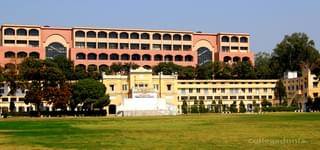B.Sc (Ag.) Latest Updates
04 Feb, 2026 AP EAPCET 2026 registartion starts on 4th Feb and the exam dates are from 12th to 20 May 2026 – Click Here
17 Jan, 2026 KEA has started the application for UG CET 2026. Apply by 17th February, 2026. Apply Here.
03 Jan, 2026 SAAT 2026, the 17th edition of this entrance test, will be conducted in online format. Check Here
03 Jan, 2026 Karnataka UGCET Exam Dates released. Kannada Language Test on April 22. Check Dates Here
24 Dec, 2025 The AP EAPCET Exam dates have been released. AP EAPCET starts from 12th May (Eng) and 19th May (Agric and Pharmacy). Check here.
BSc Agriculture is an undergraduate course of 4 years duration that allows students to gain expertise in the field of agricultural science. Its core subjects include Crop Production Technology, Rainfed Agriculture and Watershed Management, Plant Biochemistry and Biotechnology, Organic Farming, Livestock Breeding, Agriculture Finance, Sheep Goat, and Poultry Production.
The Elective Subjects in BSc Agriculture Syllabus are Weed Management, Agribusiness Management, Protected Cultivation of Horticultural Crops, Hi-tech Horticulture, Landscaping, Agrochemicals, Micropropagation Technologies, Agricultural Journalism, etc.
BSc Agriculture can be divided into 15 departments which are Agronomy, Genetics and Plant Breeding, Agril. Entomology, Horticulture, Agricultural Economics, Agril. Extension Education, Agril. etc. Subjects from all the 15 departments are spread across all the semesters. Candidates can pursue this course if they have completed Class 12 with a minimum of 50% in Class 12 with Physics, Chemistry, Biology, and English.
BSc Agriculture Syllabus & Subjects
BSc Agriculture syllabus is broad and consists of various courses in Agronomy, Horticulture, Plant Pathology, Entomology, Agricultural Economics, Extension Education, Genetics and Plant Breeding, Soil Science, and Animal Husbandry apart from supporting courses in Basic Sciences, Humanities, and Agricultural Engineering.
The basic BSc Agriculture subjects are designed in such a way that students grasp all the knowledge related to agriculture and environmental science. This course has specializations like majoring in Animal Science, Plant Protection, Soil Science, Genetics and Breeding, or Agricultural Engineering.
The following table shows some of the common subjects that are included in the BSc Agriculture course curriculum:
| BSc Agriculture Subjects | Topics/Units Covered |
|---|---|
| Principles of Crop Production | Definition and scope of Agronomy, Classification of Crops on Different basis, General principles of Crop production: Climate, soil and its preparation, seed, and seed sowing, post-sowing tillage, water management, nutrition, plant protection measures, harvesting, threshing, and storage, Crop sequences and systems with an emphasis on mixed cropping and intercropping, etc. |
| Fundamentals of Soil Science | Definition of Soil, Components of Soil and their role in agriculture, Soil forming rocks and minerals, Development of Soil profile, Soil formation, factors affecting soil formation, soil forming processes, Soil reaction and its measurements and significance, Physical properties of soil, and their significance, Chemical properties of soil, cation, and anion exchange phenomenon and their importance in agriculture, etc. |
| Elements of Genetics | Definition, significance, and historical development in genetics, Mendel’s Laws of heredity, Cell division, meiosis, and mitosis, Chromosomal theory of inheritance, Linkage and crossing over-types, mechanism, and significance, Nucleic acid as genetic material structure and replication, Mutation-spontaneous and induced, etc. |
| Agricultural Meteorology | Different meteorological variables related to agriculture, Rainfall- Hydrologic cycle and its components, Types, and forms of precipitation, Humidity, definition, wind vane, Anemo-meter, Indian Agro Climatic Zones Elementary idea of weather forecasting, etc. |
| Elementary Crop Physiology | Role of plant physiology in agriculture, Cell structure and function, Bio-Physico-chemical phenomenon-diffusion, osmosis plasmolysis and imbibitions, Absorption of water and mineral salts, Photosynthesis - light and dark reactions, etc. |
| Introductory Plant Physiology | Definition and importance of plant pathology, Causes of plant diseases, Classification of plant diseases according to cause and occurrence, Plant Pathogens, Different types of spores, Levels of parasitism, etc. |
| Principles of Plant Breeding | Plant Breeding-history, objectives, and scope, Mode of reproduction in crop plants in relation to breeding techniques, Plant variation kind, and causes, Genetic consequences of self and cross-pollinated crops, etc. |
| Livestock Production and Management | Importance of livestock in Agriculture, Breeds, and Breeding methods of livestock and their consequences, Pasture management, Importance of scientific Feeding, etc. |
| Introduction to Plant Biotechnology | Definition scope and importance of plant biotechnology, Plant tissue culture, Cloning vectors for recombinant DNA, Application of plant genetic engineering in crop improvement, etc. |
Other than this, the other common subjects are Weed Management, Crop Diseases, Soil Microbiology, Soil Fertilizers, Horticulture, Silviculture and Agroforestry, Agricultural Economics, Seed Production Technology, Post Harvest
BSc Agriculture Scheme of Assessment
The evaluation of BSc Agriculture subjects is based on different parameters such as Presentation, Project Work, Report Writing Skills, etc.
Have a look at the following table to know the parameters that are involved in the scheme of assessment of this course which is followed by more or less all the colleges:
| Project Planning and Writing | Presentation |
| Monthly Assessment | Output delivery |
| Business networking skills | Report Writing Skills |
| Technical Skill Development | Final Presentation |
BSc Agriculture Books & Course Material
Some of the common books and course materials that are advised to be considered for this course are mentioned in the following table:
| Name of the Book | Name of the Author |
|---|---|
| History of Agriculture | M.S. Randhawa |
| The Future of Indian Agriculture | Y.K. Alagh |
| Principles of Agronomy | S.R. Reddy |
| The Nature and Properties of Soil | N.C. Brady and Ray Weil |
| Principles of Vegetable Production | S.P. Singh |
| Land and Water Management Engineering | V.V.N. Murty |
| The Insects: Structure and Function | R.F. Chapman |
| Principles of Plant Breeding | R.W. Allard |
| Plant Physiology | R.K. Sinha |
BSc Agriculture Entrance Exams Syllabus
The BSc Agriculture Admission process is different in different colleges. Some take admission on the basis of a written round or direct interview. Some take admission on the basis of performance in BSc Agriculture Entrance Exams, followed by counselling.
Some of the common entrance exams are KEAM, BHU UET, etc. The syllabus usually consists of sections such as Physics, Chemistry, Mathematics, or Biology, along with a section on Agriculture.
The Agriculture section is not present in all the entrance examinations, but is present in exams such as CGPAT 2024, among others. The common sections included in the entrance exams conducted for BSc Agriculture admissions are:
- Physics:
It includes topics such as Dimensional Analysis, Kinematics, Waves and Oscillations, Gravitation, Electrostatics, Thermodynamics, etc.
- Chemistry:
It includes General and Physical Chemistry, Inorganic Chemistry, Organic Chemistry, etc.
- Biology:
It includes topics such as Botany, Developmental Biology and Genetics, Taxonomy Evolution, Economic Zoology, Communicable Diseases, etc.
- Mathematics:
It includes topics such as Algebra, Trigonometry, Differential Equations, Numerical Methods, Linear Programming, etc.
- Agriculture:
It consists of topics from Agricultural Physics, Agricultural Chemistry, Agricultural Mathematics, etc.
Similar Courses:
BSc Agriculture Syllabus FAQs
Ques. What are the subjects in BSc agriculture?
Ans.
| Comprehension and Communication Skills in English | Production Economics and Farm Management |
| Fundamentals of Agribusiness Management | Rural Sociology and Constitution of India |
| Plant Biochemistry | Agricultural Marketing, Trade and Prices |
| Agricultural Finance and Co-operation | - |
Ques. Is there maths in BSc agriculture?
Ans. There are no such specific subjects as Math, You will need other science subjects to pursue a BSc Agriculture.
Ques. What is the salary for a BSc agriculture graduate?
Ans. The average course salary offered to graduates of Bachelor of Science [B.Sc] Agriculture course ranges from INR 5,00,000 - INR 9,00,000.
Ques. What are jobs after a BSc agriculture?
Ans. Job Roles for Agriculture Graduates
- Agriculture Junior Engineer.
- Agriculture Forest Officer.
- Agricultural Field Officer.
- Agriculture Development Officer.
- Researchers.
- Technologist.
- Lab Assistance.
- Assistant Professor.



![Siksha 'O' Anusandhan University - [SOA]](https://image-static.collegedunia.com/public/college_data/images/appImage/1737985425Screenshot20250127191243.png?h=150&w=320&mode=stretch)
![Roorkee Institute of Technology - [RIT]](https://image-static.collegedunia.com/public/college_data/images/appImage/1707201237CDCoverPage11.jpg?h=150&w=320&mode=stretch)



![Mangalayatan University - [MU]](https://image-static.collegedunia.com/public/college_data/images/appImage/1587063265bld.png?h=150&w=320&mode=stretch)
![Deen Dayal Upadhyaya Gorakhpur University - [DDU]](https://image-static.collegedunia.com/public/college_data/images/appImage/1505106168cover.jpg?h=150&w=320&mode=stretch)
![Chhatrapati Shahu Ji Maharaj University - [CSJMU]](https://image-static.collegedunia.com/public/college_data/images/appImage/25931_CSJMU_New.jpg?h=150&w=320&mode=stretch)

Comments